How Do You Choose the Best Mobile POS System For Your Business?
Technology moves quickly, and its high velocity has been propelling point-of-sale systems into the increasingly-mobile future.
If you’re still using a traditional, clunky cash-register-style POS system, the time to upgrade to a mobile POS system is not just here; it’s hurtling past you.
But, choosing the right mobile POS system can be a daunting process.
If you’re a new business, there’s a good chance that you’ve never had to purchase a POS system before.
Similarly, older businesses likely haven’t updated their cash register or point-of-sale approach in years.
And, in both cases, there’s a lot more to think about when choosing the best mobile POS system.
Some of the criteria that are central to a great mobile system may be things you wouldn’t usually think of.
To help you find that perfect-fit mobile POS system for your small business or restaurant, we’ve compiled this list of criteria.
Understanding why these features and other criteria are essential is critical towards finding the mobile POS system that will fit all of your needs and revolutionize the way you do business and connect with customers.
1. Does the POS system have the right features for your business?
Features are what really sets a mobile POS system apart from more traditional solutions.
But, not all mobile point-of-sale software is created equally.
Finding the right fit for your business means investigating each potential solution’s features and selecting the one with the most to offer your particular business.
For example, if your business is strictly retail, your mobile POS app should have an inventory matrix feature that allows you to accurately manage backstock and know how much product you have available.
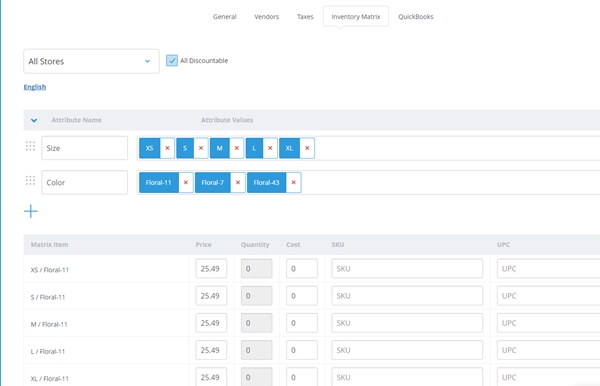
Add multiple product attributes with inventory matrix in eHopper POS.
Alternatively, if your business is a small bakery, your POS system should have the ability to maintain and keep track of ingredients.
Do you have a lot of customers that use EBT cards? That’s another feature to consider.
There may be features that mobile POS solutions offer that you didn’t even know existed, but they’ll positively impact your business.
Thus, it is important to really do your homework and make a list of each system’s features.
This will allow you to find the absolute best point of sale software that has all of the core features you need it to.
2. Is the system EMV compliant to accept credit cards?
The latest EMV chip credit cards have changed the way tellers/cashiers interact with customers and their credit cards.
The traditional method of swiping the card is being replaced with chip readers that ask that cards be inserted into the bottom of the pin pad.
This shift has undoubtedly taken some getting used to, but shoppers enjoy the reinforced security of these chip cards.
With EMV chips being the new standard of credit cards, you want to make sure that any investment in a mobile POS system also includes the ability to handle EMV credit cards.
3. Can it accept NFC payments through Apple Pay, Google Wallet, etc.?
Aside from EMV credit cards, a growing number of people use their mobile devices to make payments.
Arguably, this is a top reason to buy mobile point of sale software in the first place.
NFC stands for near field communication and is a technology that allows two devices (say, a customer’s smartphone and your mobile POS devices) to communicate with one another by merely being nearby.
This allows the customer to make a mobile purchase just by touching their phone to your POS terminal.
The payment is processed through an app on the user’s phone (Apple Pay, Samsung Pay, Google Wallet).
Because of the different types of devices, you want to make sure that you have a mobile Android POS and Apple-capable system.
Not only do these types of payments help to speed up transactions and keep queue times at a minimum, but mobile and NFC payment options are things that more and more customers are looking for in the brands they do business with, especially younger generations that utilize more of the full potential of their mobile devices.
By failing to offer the service, you could miss out on their business.
4. Can the mobile POS work across multiple mobile platforms?
One of the most significant advantages to mobile point of sale systems is just that – mobility.
It’s critical if you have a busy sales floor and lots of anxious customers to greet.
Imagine being able to help customers on the floor, even let them pay, without asking them to stand in line at a register.
A mobile POS system allows for this because the software can be housed on a tablet computer or another mobile device, which will enable you to perform the majority of cash register functions from anywhere.
If you want to use multiple devices, however, you need to make sure that your chosen POS solution can support this.
For example, having a mobile tablet platform to assist customers on the floor, but a fixed cash register computer for guests that want to browse on their own.
5. Can it support multiple registers?
Multiple devices could also include different registers in the same store location or spread out across various store locations.
If you need fifteen registers to be connected to your POS system, then you need to make sure that your chosen mobile POS solution supports this number of touchpoints.
Similarly, if you are looking for a mobile POS system for restaurants, you want to make sure that the software can handle multiple open “accounts” or tabs at once.
This allows you to start a transaction or order with a customer, but will enable them to pay at the end of their meal or visit.
If you do have multiple store locations, connectivity between stores is critical.
Mobile point of sale systems for small business use with different store locations should allow the user to look at each store individually, but also in a complete view that incorporates data from all stores.
Thus, you can see the performance of a single store, or look across all or a section of different branches.
This overall view gives you a fuller picture of your sales data.
A top mobile POS system will even allow you to see inventory across various store locations, which can help you better manage stock and ensure that all stores have each item you carry.
6. Can it manage and track customers?
Data is a big part of today’s world, particularly regarding how businesses track and engage with their customers.
Each time a customer visits your business, whether it is their first time or four-hundred-and-eleventh time, there’s an opportunity to learn about them.
How often do they visit your store per month?
What items do they buy?
How much, on average, do they spend in a single visit?
Answering these questions gives way to valuable insights into an individual customer’s buying persona and relationship with your brand.
You can use these kernels of information to target them with relevant, personalized marketing messages better, discounts and other tactics to enhance sales and customer relationships.
The data possibilities are endless, as long as you have the time and ability to track customers appropriately.
A mobile POS system like eHopper, for example, allows you to pull up previous transactions with a customer, replicate their past orders, quickly find their delivery information, input notes about the customer and more.
This exercise in learning will help you better serve that customer in his or her future visits and allow you to strengthen that brand-customer relationship even further.
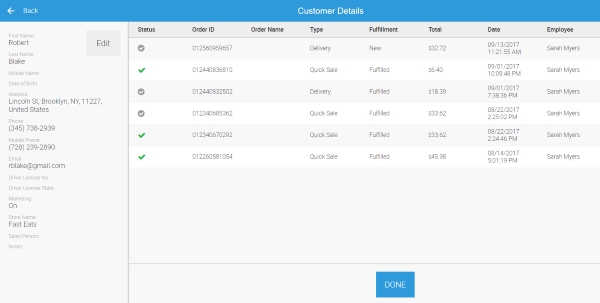
View purchase history in eHopper POS
7. Hardware costs?
This is a dreaded question when it comes to point of sale systems.
The older, clunky POS computers and cash registers can cost thousands in hardware.
The hardware cost of these systems is incredibly hard for many businesses to swallow, especially if you have to replace more than one station.
Luckily, even the best mobile POS systems are amazingly affordable compared to their traditional ancestors.
That’s because many mobile POS systems can use an iPad, Android tablet, Poynt POS or another mobile device as the primary hardware.
This keeps the costs in the hundreds, instead of the thousands.
You may even be able to use a device you already have at home.
If that’s the case, double check with your mobile POS solution for which devices support the software. When you want to add a terminal, you just buy another tablet.
Thus, the cost to expand is also kept minimal.
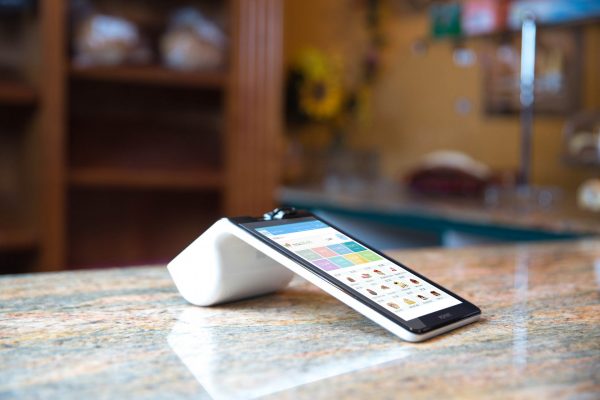
Poynt smart terminal
8. Can it support your currency and language?
This might seem like a no-brainer, but it’s always a good practice to make sure that the mobile POS system you are looking at can support the currency of your country and the language(s) of your staff.
Most systems adapt to some different currencies and language options.
9. Is there an easy way to manage employees?
Employee management can protect your business from some negative scenarios.
The most obvious is that the employee management software of your mobile POS system will allow you to schedule the right amount of staff each day, so you are never under or overstaffed.
The less obvious (and more unfortunate) side of employee management software is detecting potential cases of theft, either by directly taking from a register or lying about hours worked.
If your mobile POS system has employee management capabilities, you can see who used a register and when because each employee has their own login information.
If there’s a money discrepancy, this feature makes it easier to track the source.
It can also keep track of each person’s hours, so there’s no risk of fraud occurring.
The last benefit of employee management through a POS system is being able to track and analyze the performance of your employees.
You can determine who is doing the most sales and then leverage their know-how to teach the other employees the most successful tactics.
10. Does the system support offline mode?
The concept of having a mobile POS system scares some business owners.
“What if I lose Internet access unexpectedly?”
This is a slight detriment to any business, no matter what type of POS system you have, because credit card transactions require access to an online service.
However, a mobile POS system can still complete many different functions, even without the use of the Internet.
You can process cash transactions, award refunds, honor discounts and coupons, access order histories and make changes to current orders, assess taxes and tips and many other operations.
Once the system has the opportunity to reconnect to the Internet, it updates with all of the information changes, transactions and other processes that occurred while it was offline.
This means that operating offline doesn’t cause issues with inventory or sales reports or require you to input the data from offline transactions manually.
This is an essential feature for any mobile POS system.
11. Is Mobile point of sale affordable?
We’ve discussed the cost of hardware being far less than traditional systems, but what about the software that runs and handles all of these different mobile POS processes.
That has to cost a lot, right?
The answer depends on your solution, but most mobile POS solutions are comparatively affordable. Some even offer basic plans for little or no money.
That’s right; you could have mobile POS free of charge!
However, many free plans have limited functions or only support one (maybe two) registers.
If you want a more robust package, you can’t settle for a free
The good news is that, in most cases, you can find a plan that fits your needs and your budget.
Since most are handled through a monthly license, you can scale your investment up or down, if those needs (or your finances) change.
In this respect, business owners have a lot more freedom with a mobile POS system and aren’t forced to be locked into a long-term investment.
Conclusion
Mobile POS systems are the future, but they are also the now.
The longer you wait, the more you’ll lag behind your competitors that have already adopted a mobile-ready POS system.
By following this criterion and answering the above questions, you will have no problem finding the perfect mobile POS solution for your business and using that system to its absolute fullest.
Need to get your business moving with a powerful mobile POS system? Try eHopper POS today risk free!
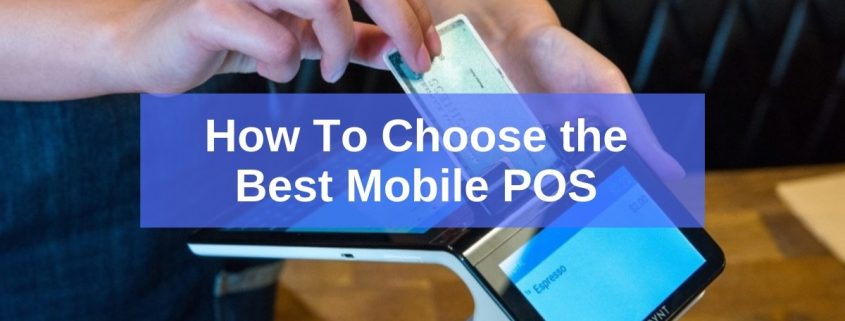

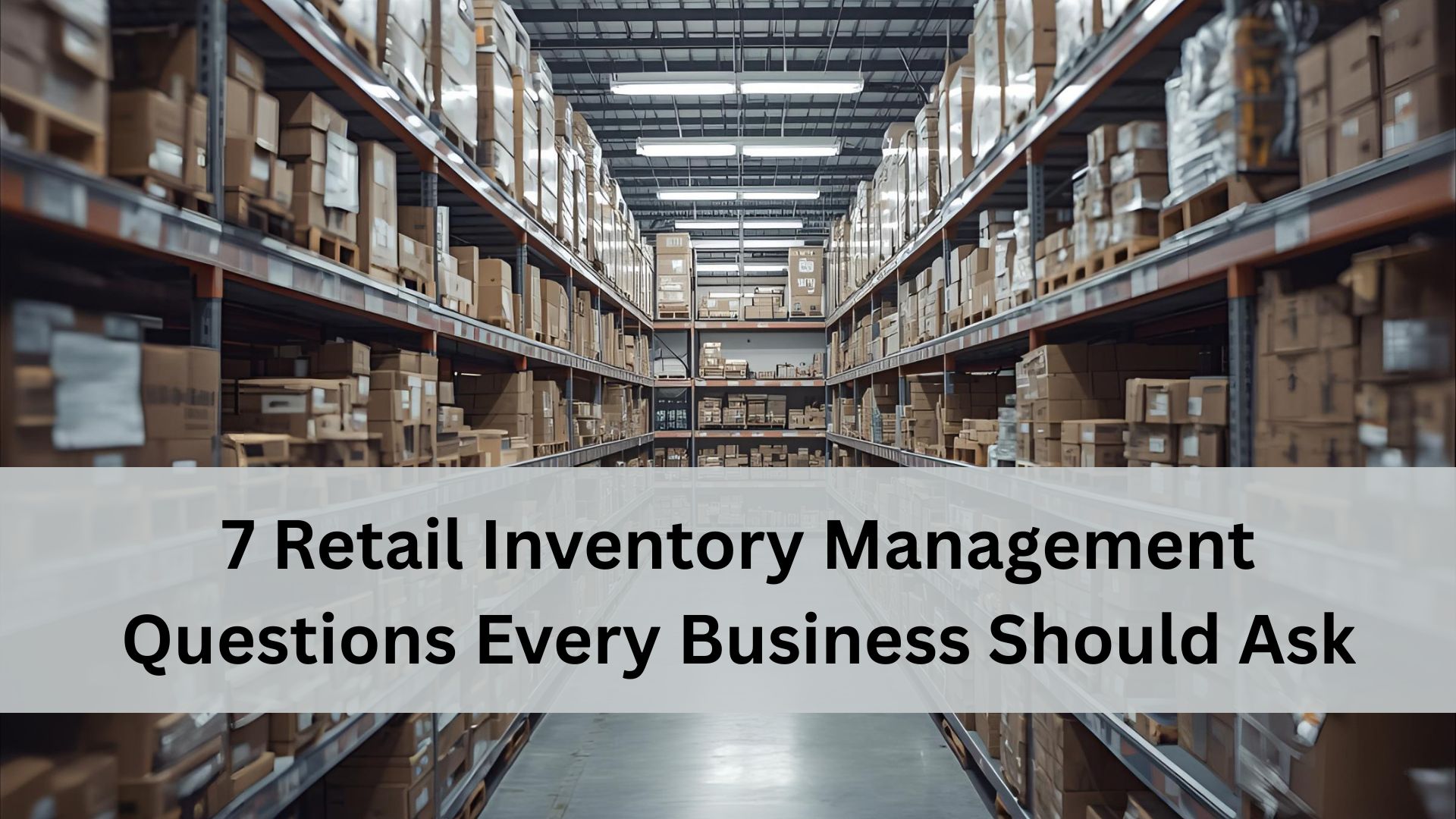
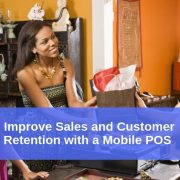


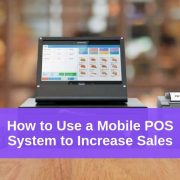


I use a mobile POS in my retail store. It is really affordable and easy to use!